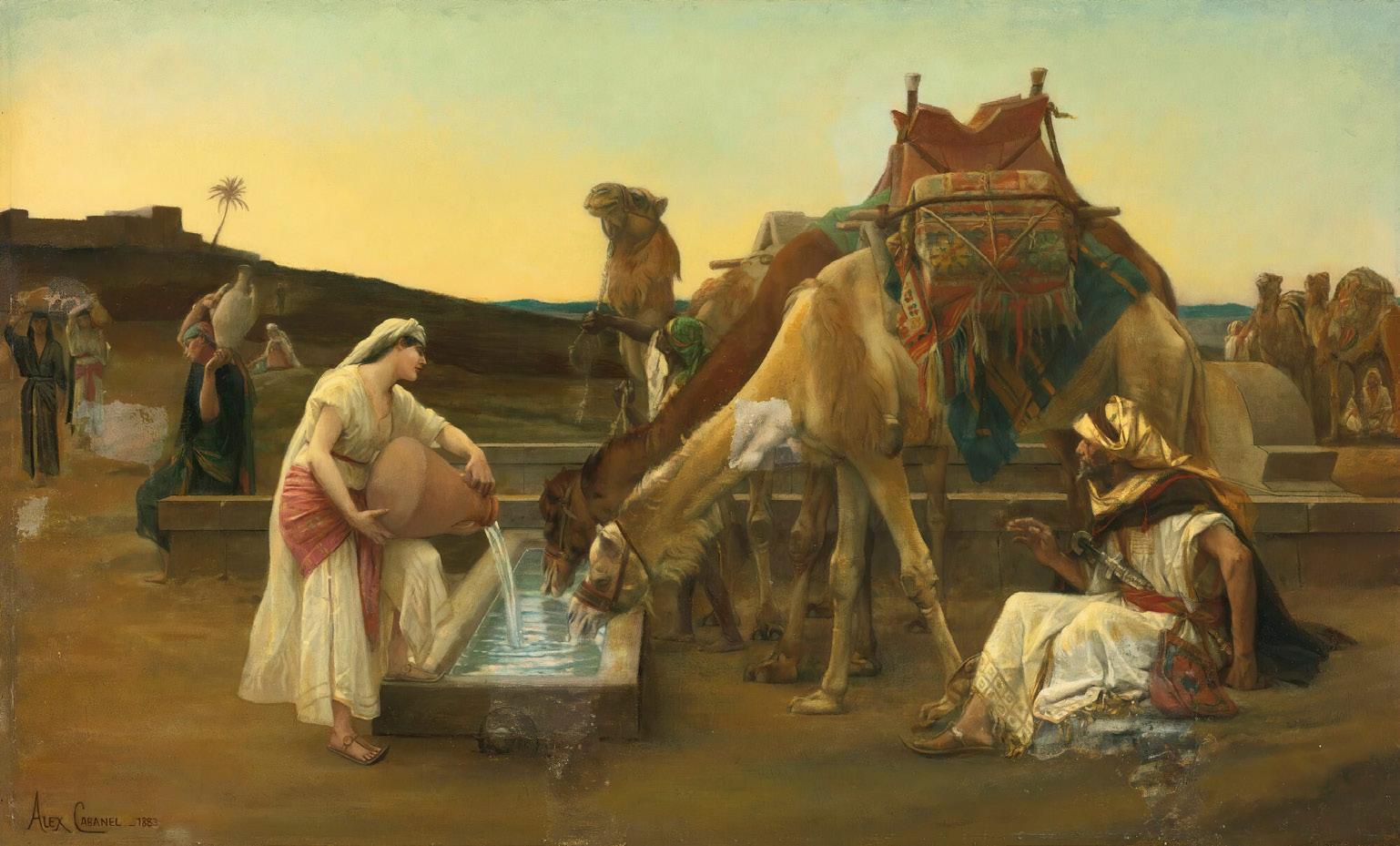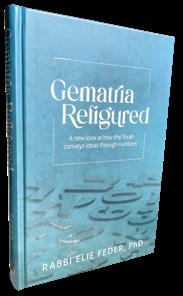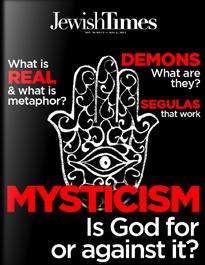BOOKS
 PARSHA
PARSHA





 RABBI REUVEN MANN
RABBI REUVEN MANN
VOL. XXI NO. 3 — NOV. 25, 2022 e
GOD’S PROVIDENCE
Greatest Deslre & the GREATEST FEAR Gematria
RABBI MOSHE BEN-CHAIM
RABBI ELIE FEDER PHD
Unblemished
RABBI MOSHE BEN-CHAIM
PARSHA
SIN





2 | WWW.MESORA.ORG NOV. 25, 2022
click any icon in this issue the FREE
Just
| HUMAN EQUALITY |
e Rabbis teach us to initiate greetings and not wait to merely respond. We must also greet literally all people, young and old, Jew and gentile, profes sionals and laborers. e purpose is to restrain any ego expression feeling that others are less worthy and must recognize us rst, or that some people are completely unworthy. Ego and anger are the 2 emotions we must never express.
BASED ON A LECTURE BY RABBI ISRAEL CHAIT

BOOKS
Gematria Refigured




Are you a bit skeptical of gematria? Well, I was. Until I discovered how Chazal use gematria to direct our attention to a very specific type of idea. Let me provide one example.

Hashem’s Blessing to Avraham
The Torah describes Hashem’s blessing to Avraham (Bereishis 24:1): “Avraham was old, advanced in age. And Hashem blessed Avraham with everything.” What does it mean that Hashem blessed Avraham לכב, with everything? What does “everything” refer
Subscriptions are free. To subscribe, send any email to join@mesora.org We invite feedback at comments@mesora.org –––––––––––––––––––––––––Articles may be reprinted without consent of the Jewishtimes or the authors, provided the content is not altered and credits are given. WWW.MESORA.ORG NOV. 25, 2022 | 3 3
Books
Rabbi
MOSHE
Maimonides enlightens us
his precise
formulations MESORA
RABBI ELIE FEDER PHD.
Feder presents a fresh understanding of Gematria 6 The Greatest Desire RABBI
BEN-CHAIM
through
halachic
9 God’s
RABBI MOSHE BEN-CHAIM Torah’s clues unravel how God directs the lives of righteous people 16 Unblemished
RABBI REUVEN MANN Rare individuals of great dedication lead di erent lifestyles
RABBI ELIE FEDER PHD.
Providence
Burnt O ering
(CONT. ON NEXT PAGE)
THE JOURNAL ON TORAH THOUGHT | Please send letters and questions to: Comments@Mesora.org |
to? One would naturally think it refers to length of days, honor, wealth, and children (as Ibn Ezra and Ramban suggest). However, Rashi o ers a surprising explana tion of לכב, everything, based upon its gematria (52) being the same as that of ןב, a son. Thus, Rashi interprets the pasuk as teaching that Hashem blessed Avraham with a son.
On the surface, this di cult explanation seems to be diminishing Hashem’s stated blessing to Avraham. The pasuk says, “Hashem blessed Avraham with every thing,” and Rashi limits it to only one thing - a son. What motivated Rashi to avoid the plain interpretation? Furthermore, as familiar as it is, reinterpreting a word based upon its numerical value seems troubling. What is the purpose - here and everywhere - of using gematria to teach a lesson?


The Meaning of Everything
What would it mean for a person to have everything? If you met a genie who o ered to grant you everything, what would you request? If you began compiling a list, how long would it be? One page? Two pages? Think about it for a moment. Imagine you spent time making your list and finally decided that you were done. The genie kindly asks you: “Are you done? Are you sure? Last chance …” I don’t know about you, but I’d probably hesitate and say something like: “Hold on; give me a few minutes; I can probably think of a few more things…”
Now let’s put genies aside and return to reality. A person will rarely say, “I have everything.” We seem hardwired to want more. If we have a million dollars, we want two million; once we get two million, we want four million, etc. King Solomon wisely noted (Koheles 5:9): “He who loves money will not be satisfied with money.” It’s no wonder that our list never ends - that we can never say, “I have everything.”
Avraham’s Satisfaction
Now let’s consider the statement that Hashem blessed Avraham with everything. Could he possibly have had everything? Isn’t that unattainable? The answer can be found by analyzing the character traits of the tzaddik (the righteous person) and contrasting it with that of the average person.
The tzaddik can di erentiate between his needs and his wants. While his needs can be determined by an accurate assessment of his nature and what will truly satisfy him, his wants emerge from his unexamined wishes and unrealistic fantasies. His needs are finite; his wants are infinite. While the tzaddik can distinguish between the two, the average person often gets confused. Thus, the tzaddik can die satisfied because his finite needs can be attained. On the other hand, the average person must die unsatisfied because his infinite wants cannot possibly be fulfilled.
Explaining the Gematria
Let’s revisit the problems with Rashi’s gematria. If the pasuk says Hashem blessed Avraham with everything, why does Rashi limit it to a son? Further more, why does he take the word לכב out of its plain meaning and convert it into a number? We can answer that Rashi is dealing with a problem: While Hashem gave Avraham many things, how can the pasuk claim that He gave him everything? How is it even possible to attain everything? The answer is that it is only possible for someone like Avraham — someone who makes an accurate assessment of his life and determines what he truly needs. Then, if those needs are met, he can truly say that Hashem has given him everything.
Let us now consider Avraham’s list of everything. Would it be as long as ours? Would it have length of days, great honor, extreme wealth, and many children? True, Hashem gave him all these things — but would they be on his list? Did he need these things? Rashi is telling us: No! His list was very short; it had only one item — a son. Why was his list so short? Avraham discovered Hashem and devoted his life to helping people and teaching them about Hashem. In his wisdom, Avraham assessed that without a son to carry on his mission, it would all be lost with his death. Therefore, Avraham had but one need: a son. For him, a son was everything. As such, Rashi isn’t denying the plain interpretation that Hashem granted Avraham many things, but he doesn’t want us to think that they alone could have satisfied Avraham. On the contrary, Avraham needed only one thing — a son.
Why Gematria?
One question remains: Why teach this lesson through a gematria? Why do we need to butcher a word to convey this message? We can answer that the use of gematria is deliberate. The gematria converts a word into a number. But not just any word; it takes לכב, a word with infinite implication, and makes it finite. It converts “everything” to a mere quantity — 52. The gematria teaches us that, for Avraham, “everything” was not infinite, as it is for others. Because of Avraham’s realistic view of his needs, לכב was finite — it is merely another word whose quantity is 52 — a son. Gematria is precisely the appropriate vehicle to teach this idea. Taking a word and making it into a number is not butchering the word; on the contrary, it is preparing it beautifully, presenting it ready-made for our mind’s consumption. The gematria directs our minds to the nature of the idea that Rashi is elucidating.
You may be wondering: Can this be done with other gematrias? The short answer: yes and no. Check out my new book, “Gematria Refigured” on the next page to find out more.■
4 | WWW.MESORA.ORG NOV. 25, 2022
SHARE
BOOKS
Gematria is a polarizing topic. While many love it, many others view it with skepticism.
What is the purpose of gematria?

Can we truly learn anything from the numerical representation of words?
What is beneath these creative yet apparently simplistic interpretations?
While jointly pursuing semichah and a PhD in mathematics, it seemed natural for Elie Feder to love gematria. However, he was bothered by these compelling questions. That is, until he discovered the purpose of gematria.
Gematria Refigured presents the discov eries that led to the author’s transformation from a gematria skeptic to a gematria lover. It develops a theory which elucidates how the Torah and Chazal use gematria to direct us toward a very specific type of idea. Through its many examples, this work illus trates how gematria can help us uncover novel insights, while providing interesting and clearly formulated perspectives into many mitzvos, themes, and stories in Tanach.



Buy on Amazon, click below:
bit.ly/Gematria1
WWW.MESORA.ORG NOV. 25, 2022 | 5 BOOKS
THE GREATEST Desire
RABBI MOSHE BEN-CHAIM
Self-preservation is our greatest desire. There’s no escaping it, and it’s a good thing. With it, we ensure greater longevity to achieve God’s will for our lives. But as God gave us a soul—in telligence—He wills that we engage it in all decisions including self-preservation. But God also designed us with imagination, the faculty that helps us arrive at answers, solutions and growing insight into all God created, from nature to Torah. But if abused, imagination can lead us to sin and to believe in things that do not exist.
Idolatry and superstitions are man’s imagined securities. As they are only imagined and non-existence, God prohibits such beliefs and actions. Maimonides o ers insight:

Soothsaying is Prohibited
Soothsaying (omens) as do idolaters, is forbidden. For example, those who say, “Since a piece of bread fell out of my mouth, or my sta fell from my hand, I will not travel to this place today, since I will not be successful Or, since a fox passed on my right side, I will not go out of my door today. Similarly, a person who sets up omens saying, “If A
happens, I will do B. If A will not happen, I will not do B,” as did Eliezer, the servant of Abraham, and similar things… all this is forbidden. (Laws of Star Worship 11:4)
Diviners are Prohibited
What is a diviner? It is a person who performs certain deeds to cause him to fall into a trance and have his mind cleared of all thoughts until he can predict the future, saying, “This will happen” or “This will not happen,” or saying, “It is proper to do this; be careful to do that.” (Laws of Star Worship 11:6)
Fortunetellers are Prohibited

Who is a fortuneteller? A person who tries to predict auspi cious times, using astrology and saying, “This day will be a good day,” or “This day will be a bad day,” “It is appropriate to perform a particular task on a certain day” or “This year” or “This month will not be opportune for this particular matter.” (Laws of Star Worship 11:8)

Maimonides says it is prohibited to act on omens, “as do idolaters.” But regarding diviners and fortunetellers, Maimon ides includes no such condition of, “as do idolaters.” Meaning “all” divining and fortunetelling are prohibited, but not “all” omens are prohibited. Thus, certain omens are permitted. This is startling! I have always assumed “all” omens to be idolatrous…unconditionally. But as Maimonides is famous for his precise wording and halachic formulations, we must think into his distinction: how are certain omens permitted?
Maimonides starts cluing us in by saying that the model of prohibited omens is Eliezer. But Eliezer was Abraham’s servant! He prayed to God to show him a wife for Isaac. Eliezer sought the sign of a wife worthy of Isaac: “Let the maiden to whom I say,
6 | WWW.MESORA.ORG NOV. 25, 2022 (CONT. ON NEXT PAGE) SHARE
SIN
camels’—let her be the one whom You have decreed for Your servant Isaac” (Gen. 24:14). God then answered him before he even finished praying (Ibid. 24:15). God endorsed his omen! How then can Maimonides state that the model of prohibited omens is Eliezer?! Maimonides remains the master logician. With his words above, “Soothsaying as do idolaters, is forbidden,” Maimonides thereby teaches that it is only the unreasonable “idolatrous” omen that is forbidden. Assuming a black cat crossing my path has some e ect on reality, is without reason; that is an idolatrous omen. But if one acts rationally, seeking certain character traits as signs of worthiness for his master’s son’s wife, and then takes that perfected girl as his wife, that is not unreasonable. Thus, omens have 2 forms: a prohibited and a permitted form.



Now, when Maimonides says Eliezer is the “model” of a prohibit omen, he means one must “act” upon an omen to violate the prohibi tion, just as Eliezer “acted” when taking Rivkah for Isaac. He does not mean Eliezer violated anything. He means that one does not violate omens unless he alters his behavior like Eliezer; he must act on his omen. But the psychological “belief” that a black cat is unlucky, is no violation of omens, unless the person alters his behavior due to that belief.
Thus, omens like good character indicating a woman’s worth are accurate omens, but black cat omens are purely superstitious and prohib ited. Omens have 2 forms. But diviners and fortunetellers have no redeeming qualities; they are absolutely and always prohibited, as such notions are false and idolatrous. Thus, they are always forbidden: there are no dates that guarantee success, and there exists no human knowledge of the future. ■
SHARE NEW VIDEOS: www.mesora.org • PRAYING AT TZADDIKIMS’ GRAVES • DOES TEHILLIM HEAL? • DOES MEZUZAH PROTECT? • WHAT IS THE “EVIL EYE”? • DEMONS, REINCARNATION & DEATH

8 | WWW.MESORA.ORG NOV. 25, 2022 Designers of the Jewishtimes & Mesora.org Building loyalty and sales through design strategies 516.569.8888 NYDesign.com Branding UI/App Design Wires/Prototypes App Store Design Dataviz/Charts Infographics Iconography Illustration Websites Landing Pages Editorial Design Presentations Social Media Advtg/Promo Animation Packaging
PARSHA

GOD’S PROVIDENCE
RABBI MOSHE BEN-CHAIM
Why did God plan Jacob to clutch Esav’s heel at birth?
Why did God create Esav covered in hair?

WWW.MESORA.ORG NOV. 25, 2022 | 9
SHARE
Reading the Parsha each week, at times we gloss over “simple” information, assuming nothing more is intended below the surface. But this cannot be the case. Maimonides teaches, “There is a good reason for every passage; the object of which we cannot see. We must always apply the words of our Sages: ‘It is not a vain thing for you’ (Deut. xxxii. 47), and if it seems vain, it seems your fault’.” (Guide, book III, chap. L) With this in mind, let’s recap the story of Toldos and then isolate the questions.
Rivkah experienced a troubling pregnancy: the children were moving violently within her. Ibn Ezra says that Rivkah first asked other women if her pregnancy was the norm. When the women told her that her pregnancy was abnormal, she sought counsel from God via a prophet (either Abraham or Shem, Noah’s son). Rivkah was aware of God’s providence; initiated with Abraham and sustained unto Isaac and herself. The nation of the Jews was to be established through her. This pregnancy was unnatural and must be due to God’s will.
The prophet informed her that she will give birth to twins (two nations) and that the “greater son will be subservient to the younger.” This was the primary message. When she finally gave birth, Esav exited first, and the Torah describes him as red and covered with hair. Jacob then exited; his hand was seizing Esav’s heel. The Torah then says that Esav became a hunter while Jacob was a dwelled in tents. Isaac loved Esav, for he captured food for Isaac, while Rivkah loved Jacob. The Torah hints at an imbalance.
We then learn of the sale of the birthright. Jacob’s alacrity in requesting the birthright in exchange for the lentils appears premeditated. Later, Rivkah “somehow” hears Isaac preparing to give the blessings to Esav. Rivkah dresses Jacob in goat skins and in Esav’s garments scented from the field to deceive the senses of the now blind Isaac into thinking Jacob is the hairy hunter Esav. The ruse works. And not a split second after Jacob leaves Isaac’s presence, Esav enters requesting the blessings. This greatly frightens Isaac, as he realized through a successful blessing of Jacob that he must have been wrong about Esav. The blessings’ success indicated divine providence favoring Jacob, while all along Isaac favored Esav. Now our questions:
• What was God’s intent that Rivkah experience an unnatural, tormenting pregnancy?
• Why was Rivkah’s response to inquire about God’s providence from a prophet?
• And why did she inquire from the prophets Abraham or Shem, but not of her own husband Isaac?
• Of what significance is Esav’s hairy nature?
• Why are we told that Jacob seized Esav’s heel at birth?
• Of what significance is it that “Rivkah loved Jacob, while Isaac loved Esav?”
• How was Jacob “instantly” prepared to purchase the birthright from Esav when he asked for the lentils?
• Why are we told that Rivkah heard that Isaac was about to bless Esav?
• Why did Rivkah and Jacob agree they must deceive Isaac to obtain the blessings; why not ask Isaac openly?
• Why was Isaac shocked when Esav came before him to receive the blessings?
It is clear: God intended Rivkah to obtain information vital to the establishment of the Jewish people. Her di cult pregnancy was intended to direct her to one who would inform her of God’s intentions. With that new informa tion obtained via the prophet—“the older would serve the younger”—Rivkah now cherished Jacob over Esav, as she learned through that prophecy that a matter of “nations” depends on the younger Jacob. (She was told that two nations would issue from her.) The prophecy taught her to be instrumental in securing the younger son’s success, as a means of establishing the nation of Israel. She also deduced that for good reason, God bypassed Isaac, withholding from him this prophetic information.
The patriarchs and matriarchs did not function in accord with simplistic favoritism. We must not erroneously project such motivation onto them. Thus, when the Torah teaches that, “Isaac loved Esav while Rivkah loved Jacob” it teaches an important lesson. It appears this lesson is that Isaac was not as well informed as was Rivkah about the natures of their two sons. Thus, the Torah saw fit to teach us the imbalance of their divergent loves, so we might appreciate how God orchestrated His
providence. As Isaac was misled by Esav’s “capturing his father with his mouth” (Gen. 25:28), Isaac desired to bless Esav and not bestow these blessings upon Jacob. Isaac was deluded by Esav’s ostensible good nature, as Esav disguised himself as upright with inquiries of proper conduct (capturing him) only to earn Isaac’s favor. In truth, Esav was evil. In contrast, the Torah teaches that Jacob was a “dweller of tents” (ibid 25:27): he was complete in his perfection and delved into the study of God.
Jacob’s proper lifestyle did not present the facade o ered by Esav’s veneer. Esav presented himself in the manner he knew his father would cherish. He “captured his father with his mouth.” Thus, the Torah thereby informs us of the need for God’s providence to work through Rivkah; she had clarity. From the very outset of the lives of Esav and Jacob, Rivkah was taught that the younger Jacob was to rule his older brother and that Jacob was to receive the blessings. This was also substanti ated through Jacob’s clutching of Esav’s heel. This strange phenomenon taught Rivkah that Jacob—right out of the womb—was one who could contend and usurp his twin. Rivkah relied on this knowledge later in her plan to deceive Isaac.
It was also vital that Rivkah receive the prophet’s communication before giving birth. Now that she understood the younger was to be favored, she could interpret Jacob clutching Esav’s heel as a divine message. God was showing Rivkah the means that He implanted into human nature to ensure her success. God also created Esav with a hairy exterior, which would also play a vital role in Rivkah’s plan.
The Torah tells us how Esav arrives home exhausted. The Rabbis teach he had murdered, committed adultery and idolatry, for on that day, Abraham had died. Esav—a man seeking an Earthly, hedonistic existence alone—was frustrated that his grandfather Abraham would actually perish from this Earth. Esav’s immortality fantasy was abruptly shattered. He no longer clung to any role model displayed by Abraham: “For what good is life, if it ends?” Esav felt. He therefore went astray from Abraham’s values and committed these grave acts. Esav, exhausted and famished, requested the lentils which Jacob had cooked. Jacob “instantly” countered with
1 0 | WWW.MESORA.ORG NOV. 25, 2022 SHARE
(CONT. ON NEXT PAGE)
his o er to purchase the birthright from Esav, in exchange for the lentils. Thus, Jacob’s purchase was premeditated. He had already planned to obtain the birthright prior to this event; now the moment was ripe. We might explain Jacob’s readiness to obtain the birthright was due to Rivkah’s informing him of her knowledge obtained via that earlier prophecy. Rivkah most probably explained to Jacob years earlier what she learned, that the younger Jacob was to rule over the older. This is supported by Jacob’s readiness to purchase the birthright.
Later, when Rivkah “happens to overhear” (divine providence) that Isaac was about to give the birthright blessings to Esav, she urges Jacob to deceive his father and to disguise himself as Esav. The point here is that Rivkah is not first informing Jacob “that” he must obtain the birthright, but rather, “how” he can accomplish this. Thus, we find proof that Jacob already knew he was to obtain the birthright blessings. This is why he purchased them from Esav at the outset, for Rivkah must have instructed him to do so. Otherwise, without a proper purchase, what right would he have to take the birthright later? And without Rivkah informing Jacob that he should have the blessings, why would Jacob even think to purchase them? It must be as we suggest, that Rivkah learned through prophecy that Jacob must obtain the blessings and told Jacob. Therefore, Jacob was prepared at all times for the right moment to purchase them. Then, he must act to obtain them, even through deceit. For a lie is not absolutely prohibited by God. As we see God told Samuel (Sam. I; 16:2) to make believe he was o ering a sacrifice, although he was truly en route to anoint David in Saul’s place. Samuel feared that Saul would learn of this and would kill Samuel for attempting to

replace him with a new king. Thus, God instructed Samuel in a deception. Jacob too did not argue with Rivkah about the deceit here. He was only concerned that his father would not curse him, but he had no concern about the deceit itself as a sin to God. Jacob knew a lie is necessary at times. And Rivkah—as well as many others—lied for just reasons. Ibn Ezra teaches there is no harm in lying if it is for a proper motive (Gen. 27:13).
In summary, Rivkah required divine instruc tion due to the imbalance between Esav and Jacob, and between her and her husband. She would have to act to bring about the nation of Israel. God orchestrated an abnormal pregnan cy precisely to educate Rivkah on matters of this pregnancy: the issuing nations of Jacob and Esav and how they must be guided through her, as “she loved Jacob,” i.e., in this matter she grasped reality whereas Isaac did not. Compelled to inquire from a prophet, she avoided asking Isaac about the pregnancy as she understood Isaac was lacking clarity. Rivkah became equipped with the divine knowledge, vital to ensure the blessings are bestowed upon the proper recipient.
There was a need for Rivkah to learn of the di erent natures of her two sons. She learned through prophecy that Jacob would be the superior. But she also learned one more essential lesson through seeing his hand clutching Esav’s heel: Jacob possessed the natural tendency to usurp Esav. It was only through this knowledge gained by seeing his hand grabbing his brother’s heel that Rivkah thereby learned that she must harness his nature to ensure the prophecy comes to be. Had she merely received knowledge that Jacob was to be superior, this knowledge alone does not compel her to act through
Jacob. Rather, it was the act of Jacob grabbing his brother’s heel whereby Rivkah understood she was seeing this for a reason. She deduced that this competitive display was necessary to indicate that her two sons have various natures, through which she must play a role to ensure these natures are acted out. She must make Jacob topple Esav in “status” when the time is right.
Rivkah teaches Jacob this prophecy when he is young, and from that point forward, Jacob is ever-prepared to purchase the birthright. And at the right moment, Rivkah and Jacob strategize a plan that succeeds, but again, only through God’s providence. For we see that, “no sooner that Jacob left, did Esav return.” This is to teach that God controlled the timing to the second, ensuring Rivkah and Jacob’s success (Gen. 27:30). And finally, Isaac too attests to Jacob’s rightful receipt of the blessings, as he tells Esav, “and he is surely blessed” (ibid 27:33). For Isaac realized that since he was able to utter the blessings, then it must have been God’s will that Jacob had received them.
Isaac’s sudden fright (ibid 27:33) also explains why Rivkah did not inquire from her husband about her abnormal pregnancy, but only from Abraham or Shem. For she under stood that Isaac would reject the idea of Esav’s unfit character. That is why Jacob too could not openly ask for the blessings, even though he rightfully purchased them. Until Isaac success fully uttered the blessings, he would not accept Esav as unfit. Therefore, Rivkah avoided approaching Isaac with her concerns regarding her pregnancy, and also when securing the blessings for Jacob. And Isaac again confirms to Esav that Jacob was correct in taking the blessings, as Isaac says to Esav, “your brother came with wisdom and took your blessings.”
WWW.MESORA.ORG NOV. 25, 2022 | 1 1 SHARE
(CONT. ON PAGE 13)
Jacob follows Rivkah’s divinely-inspired plan to wear goatskins to fool Isaac and rightfully obtain the birthright

1 2 | WWW.MESORA.ORG NOV. 25, 2022 Thought-provoking articles on Torah, Israel, science, politics and readers’ letters. 25 Years. 625 Issues Share a FREE subscription. Click icon below: SHARE
Why does Isaac say, “with wisdom”? Perhaps to teach Esav that Jacob was correct.
The obvious questions and the clues to their answers are the true “codes of the Torah.” This is God’s method of directing us to unlock the Torah’s mysteries, imbuing us with an ever-growing appreciation for His wisdom, the development of our minds and souls, and understanding the perfection of our matriarchs and patriarchs.
Could it be that God prepared Rivkah to be Lavan’s sister, so she might learn of his cunning, as a preparation of this necessary deceit of Isaac? And could it be that Rivkah’s training of Jacob to use deceit helped to prepare Jacob to deal with Lavan for those 20 years when Lavan tried again and again to deceive Jacob? If so: it ends up that Lavan’s cunning came back to haunt him. For he displayed deceit to Rivkah in their childhood home. Thereby, Rivkah learned to be cunning herself and achieved a good outcome of the blessings. Through Rivkah’s cunning, Jacob learned how to deal with Lavan. Lavan’s cunning came full circle and ended up ruining him.
It is also clear from here and other Torah stories that God works with His prophets and righteous individuals through wisdom. God merely handed Rivka certain clues, without spelling out a plan. For God desires His servants to engage wisdom and devise their own plans, and not disengage their minds. God told Abraham that Sodom was exceedingly evil, yet, there existed the option that He would not destroy them. Again, God hinted to a matter that generated curiosity in Abraham’s mind, and so he inquired of God’s system of justice.
Part II
Having read this, my friend Shaye Mann asked a fine question: “I understand that ‘after’ Rivkah witnessed Isaac favoring Esav, that Rivkah had grounds to omit Isaac from her prophecy and her plans. But before she even had the prophecy, prior to giving birth…she avoided asking Isaac for an explanation of her abnormal pregnancy! She asked either Shem or Abraham. How can you explain this avoidance of Isaac ‘before’ Isaac ever expressed any favoritism towards Esav?”
I recognized the problem Shaye had raised, and immediately went back to the verses. Reading from the very beginning of the parsha, I was bothered by the first two verses:
“And these are the generations of Isaac son of Abraham; Abraham bore Isaac. And it was when Isaac was forty that he took Rivkah the daughter of Betuel the Arami from Padan Aram, the sister of Lavan the Arami, for a wife”.
Think about this: the first verse already says, “Isaac son of Abraham.” Why then does it repeat, “Abraham bore Isaac?” And in verse 2, if we are already told that Betuel, Lavan’s father was an “Arami”, (ostensibly a nationality), why are we told again that Lavan was also an “Arami”? If Lavan’s father was an Aramite, then we know Lavan his son is also an Aramite!
There are no redundancies in God’s Torah. I thought about the first question. I realized “Abraham bore Isaac” must indicate something new. Abraham sought a wife for Isaac. We thereby learn that Isaac was incapable of selecting one for himself. We may suggest, “Abraham bore Isaac,” means that Abraham “raised” Isaac. In other words, Isaac—more than any other—was in need of paternal dedication and guidance. He was not as others, who approached marriage independently. His self-sacrifice on the altar had a profound e ect on his nature. He was not even allowed to leave the land, as God told him to remain in Gerar and not descend to Egypt. Therefore, this first verse seeks to emphasize Isaac’s nature as greatly dependent upon Abraham.
The second verse teaches an apparent redundancy as well. We know Betuel is an Arami, so it is unnecessary to teach that his son Lavan was also an Arami…if that means a nationality. Or Hachaim teaches that Arami in fact is not indicating a nationality, but a character trait. Switching two letters (in Hebrew) “Arami” becomes “Ramai,” meaning a swindler; a liar. In this verse, we are being taught that Isaac married a woman whose father and brother were liars. So even though we are taught that Betuel was a liar, we must also be taught that Lavan too chose this lifestyle, as it is not inherited, as seen from Rivkah’s upright stature. Now the questions:
Why must we learn of Isaac’s dependency on Abraham? Why must we learn that Rivkah’s father and brother were liars? I feel these two verses answer my friend Shaye’s question.
We are taught that Rivkah—one who observed cunning personalities in her father and brother—was able to detect Isaac’s shortcomings in terms of interpersonal issues. This prompted Rivkah to avoid approaching her husband Isaac with matters of her pregnancy. The Torah cleverly hints to the reason why Rivkah avoided Isaac: he was not fit, and she was cunning enough to know this from experiencing shrewd human nature in her home. We now understand why she went to Abraham or Shem—and not Isaac—when she was in need of understanding the nature of her pregnancy, and how it might a ect the establishment of B’nei Yisrael.
These two verses appear at the very start of our Parsha, as they explain the succeeding verses, and Rivkah’s actions.
No question in Torah is without an answer.
This time, we were fortunate enough to discover it. Thank you Shaye.
It is amazing how subtle redundancies can shed light: one of the true codes of Torah.
God’s Providence
Esav born unnaturally covered with hair conveys Divine intent. The only other mention of Esav’s exterior is the means through which Jacob deceived his father. This teaches that God’s providence was in play at the very birth of these twins. God ensured a means existed through which the blessings would be successfully transmitted to Jacob.
First, God provides the impetus (a troubling pregnancy) to direct the righteous Rivkah towards obtaining greater knowledge. He gave Rivkah prophetic insight into the future of the Jewish nation, emanating from Jacob. It is clear that God wishes men and women to engage their intellects; we are not to sit back while God runs the world. The opposite is the case: God desires the path and progress of mankind to be steered by mankind. We are to use all in our power to achieve the best for all others and ourselves. God says this in Genesis 1:28, “Fill the Earth and conquer it.” But since man cannot know most variables or control even a few of them, God assists man when necessary. Therefore, God imparted to Rivkah His plan and the necessary tools with which to attain success. These “tools” include Rivkah’s own cunning personality adopted from her brother and father, Esav’s physical hairy nature, Jacob’s personality as capable of usurping Esav, and the knowledge of events such as Rivkah hearing Isaac’s wish to bless Esav and Esav’s wish to kill Jacob. And besides reacting to God’s clues, Rivkah devised her own methods, such as dressing Jacob in Esav’s clothing in her anticipation of Isaac’s smelling the fragrance of the field, thereby assuming this was Esav before him.
Why were the blessings necessary at all? God can certainly achieve His plan without man! I believe Isaac’s words of blessing were required as a means of silencing those descendants of Esav claiming shared rights to his legacy, along with Jacob. Talmud Sanhedrin 91a teaches how Ben Pasisa responded to Alexander when the Ishmaelites sought claim on Abraham’s legacy. Ben Pasisa responded, “If a father sends away all his sons and gives them gifts while yet alive, do these sons have any future claim on the father’s legacy?” (Referring to Abraham’s casting of all sons except Isaac, [Gen. 25]) This silenced the Ishmaelites. And I believe Isaac’s words too were necessary—not as causative of blessings, but as his exclusive selection of Jacob. Future generations of Esav can no longer justly claim an inheritance from Isaac, now that Isaac declared Jacob his sole inheritor. ■
WWW.MESORA.ORG NOV. 25, 2022 | 1 3 SHARE
Subscribe by emailing: Join@Mesora.org
Original, thought provoking articles on Torah, Israel, science, politics and







readers’ letters.
Enjoy all 625 back issues free: www.Mesora.org
1 4 | WWW.MESORA.ORG NOV. 25, 2022
Subscribe to the FREE Jewishtimes.
SHARE


WWW.MESORA.ORG NOV. 25, 2022 | 1 5 WORRIED? ABOUT YOUR BUSINESS, YOUR CHILDREN? WWW.FAPS.COM 800-258-8028 FIRST ALLIANCE PROTECTION SYSTEMS REMOTE MONITOR YOUR HOME OR BUSINESS FROM YOUR SMARTPHONE OR PC: • VIEW MULTIPLE LOCATIONS. • LIVE / RECORDED FOOTAGE. • AFFORDABLE PEACE OF MIND. • FROM A LEADER. FREE DEMO...
AN UNBLEMISHED
Burnt O ering
RABBI REUVEN MANN
This week’s Parsha, Toldot, contains the story of the second Patriarch, Yitzchak Avinu. In some ways, his life was easier than his father’s because he had the religious and intellectual foundations of Avraham to build on. But there is a certain hostility which may be directed at the heir of a great movement which has aroused controversy. Yitzchak was a target of the Plishtim shepherds, who kept filling in the wells he dug. It wasn’t so much a matter of the water but of the desire that this successor of the movement of Avraham should not achieve anything like the success of his father.


At the same time, Yitzchak’s life was intertwined with the religious destiny of Avraham. For example, it was necessary that Avraham demonstrate for all mankind the extent to which a person must go in the service of Hashem. This meant that he be willing, at the behest of G-d, to o er up his beloved son to Hashem.
It was also essential to establish for all time the veracity of Nevuah (Prophecy). If a person as rational and sober as Avraham would be willing to sacrifice his cherished son, it could only be because he was absolutely convinced of the authenticity of the prophetic message he had received from Hashem. For if he had harbored even the slightest doubt about the intention of G-d he could not have proceeded with the Akeida (the binding of Yitzchak).
In order to fulfill these objectives, Avraham had to make a Korban (sacrifice) of his son, Yitzchak, whose agreement to participate was not solicited. It is unclear
1 6 | WWW.MESORA.ORG NOV. 25, 2022
PARSHA
from the commentators how old Yitzchak was at the Akeida. But all agree that he was fully cognizant of what was going on. This is made very clear from the dialogue between father and son that is recorded in the text.
And he (Yitzchak) said, “Here are the fire and the wood, but where is the sheep for the o ering?” And Avraham said, “G-d will seek out for Himself the lamb for the o ering, my son.” And the two of them went together (Bereishit 22:7-8).
Sometimes major decisions that impact our lives are made for us without our consent. There is no question that experiencing a near catastrophic event can exert a lasting e ect and even have traumatic consequences. Is this what happened to Yitzchak?
The Torah, in this week’s Parsha, teaches us that Yitzchak was an Olah Temmima (Unblemished Burnt-O ering). This designation produced two e ects, the first of which is cited by Rashi in 25:26. There, Rashi explains that after Rivka reached the age of child-bear ing, Yitzchak waited for ten years until he realized that she was infertile and started praying for her. And, says Rashi, he didn’t want to marry a Shifcha (slave woman) because “he was sanctified at Mt. Moriah to be an Olah Temimah.”
While it was technically permitted for him at that time to have more than one wife, he had dedicated the bulk of his energy to the service of Hashem and could not divert it with additional marriages. Additionally, he could not follow the path of his father in heading to Egypt to escape the famine which broke out in Canaan. Hashem told him; “Do not descend to Egypt; dwell in the land that I shall indicate to you. (Bereishit 26:2)” Rashi comments; “…for you are an Olah Temimah and other lands are not appropriate for you.”
We may ask, what is the meaning of an Olah Temimah, and how does it preclude marrying a slave-woman in order to have children; and why does it prohibit leaving Eretz Yisrael to escape a famine? Most of the sacrifices are divided into two parts, one of which is consumed on the altar, while the rest can be eaten by the Kohanim (priests). However, a Burnt O ering is completely burned on the Altar as all of it is dedicated to Hashem and none of it is earmarked for human consumption.
We find a similar phenomenon in the realm of those who dedicate themselves to the service of Hashem. Most retain a certain portion of their time and energies for the pursuit of the ordinary vocations and interests of life. But there are those who are Kulo LaShem and devote all their time and strength to matters of Heaven.
In our history, we have encountered unique individu als who fit this description. An example which comes to mind is the Vilna Gaon (Rabbi Eliyahu of Vilna) who is reputed to have spent all his time in his study absorbed in Torah with no distractions. He did not allow himself more than two and a half hours of sleep a night, and had no practical occupations that diverted his attention.
(He was said to have mastered all the branches of the sciences and math, which were deemed consequential to obtaining a greater understanding of certain areas of Torah.)
It would appear from the story of Yitzchak that we must treat the “Olah Temimah” in accordance with his exalted nature. That is why he cannot be saddled with the burdens of an additional marriage, nor is he permitted to reside outside of Eretz Yisrael (the land of Israel). The degree to which one lives in the presence of G-d while in Israel is much greater than in Chutz Laaretz (the Diaspora). The very existence of an Unblemished Burnt-O ering such as Yitzchak Avinu (our patriarch) and the Vilna Gaon (and many others in our history) is deemed to be a great benefit for the spiritual welfare of Israel and mankind.
This insight might help us to understand the uncon ventional nature of the marriage of Yitzchak and Rivka Imeinu (our matriarch). The prophecy about the twin sons and the message that “the elder shall serve the younger” was given only to Rivka. And Rivka took it upon herself to arrange for Yitzchak’s blessings to be deceitfully transferred from Eisav to Yaakov. At no point did she confront Yitzchak with her conviction that he was sorely mistaken in his evaluation of his two sons. And Rivka, acting on her own, discovered Eisav’s plan to avenge his brother because of his “theft” of Yitzchak’s brachot (blessings). She advised Yaakov to leave home and take up residence with her brother Lavan. And she knew precisely what to say to Yitzchak in order to solicit his approval for her plan.
Rivka, unlike Sarah, did not work things out in conjunction with her husband. Rather, she took it upon herself to assume the exclusive leadership role in raising her children. She acted with great wisdom, dedication and courage. This marriage arrangement only made sense from the standpoint that Yitzchak was an Olah Temimah whose special mission in the service of Hashem took him out of the realm of certain domestic responsibilities. This placed a unique burden upon Rivka Imeinu, who fulfilled it with great distinction. May we be inspired by the example of this special and singular role model.
Shabbat Shalom.
Dear Friends, My newest book, Eternally Yours: G-d’s Greatest Gift To Mankind on VaYikra was recently published, and is now available at: https://www.amazon.com/d p/B09SHRXS3Q
I hope that my essays will enhance your reading and study of the Book of VaYikra and would greatly appreciate a brief review on Amazon.com.
Additionally, for those in Eretz Yisrael, my books are available at David Linden’s bookstore located at Emek Refaim Street 21, Jerusalem and at Pomeranz Book store, Be’eri 5 Jerusalem. They are very nice stores to visit and browse.
—Rabbi Reuven Mann ■
WWW.MESORA.ORG NOV. 25, 2022 | 1 7













Azamra Weddings LESS IS MORE! Embracing the More Authentic Post-Pandemic Reality A Real DJ for Real People JEFF NECKONOFF 516-771-9388 AZAMRADJ.COM
2 MUST READS THIS WINTER
Tohar Hayihud is a masterpiece of intelligent Torah thought. The Rabbi cites authentic Torah sources, Rishonim and great minds who, over the centuries, have rejected Kabbala’s claims as contrary to Torah. Free to download: www.mesora.org/toharhayihud.pdf


Mezuzah: Protective Amulet or Religious Symbol? addresses the popular belief in segulahs and protective devices. Martin L. Gordon refers to Torah and reason as the authorities on true Jewish concepts. Free to download: www.mesora.org/mezuza-gordon.pdf

2 0 | WWW.MESORA.ORG
MESORA FUNDAMENTALS
 PARSHA
PARSHA





 RABBI REUVEN MANN
RABBI REUVEN MANN


















































